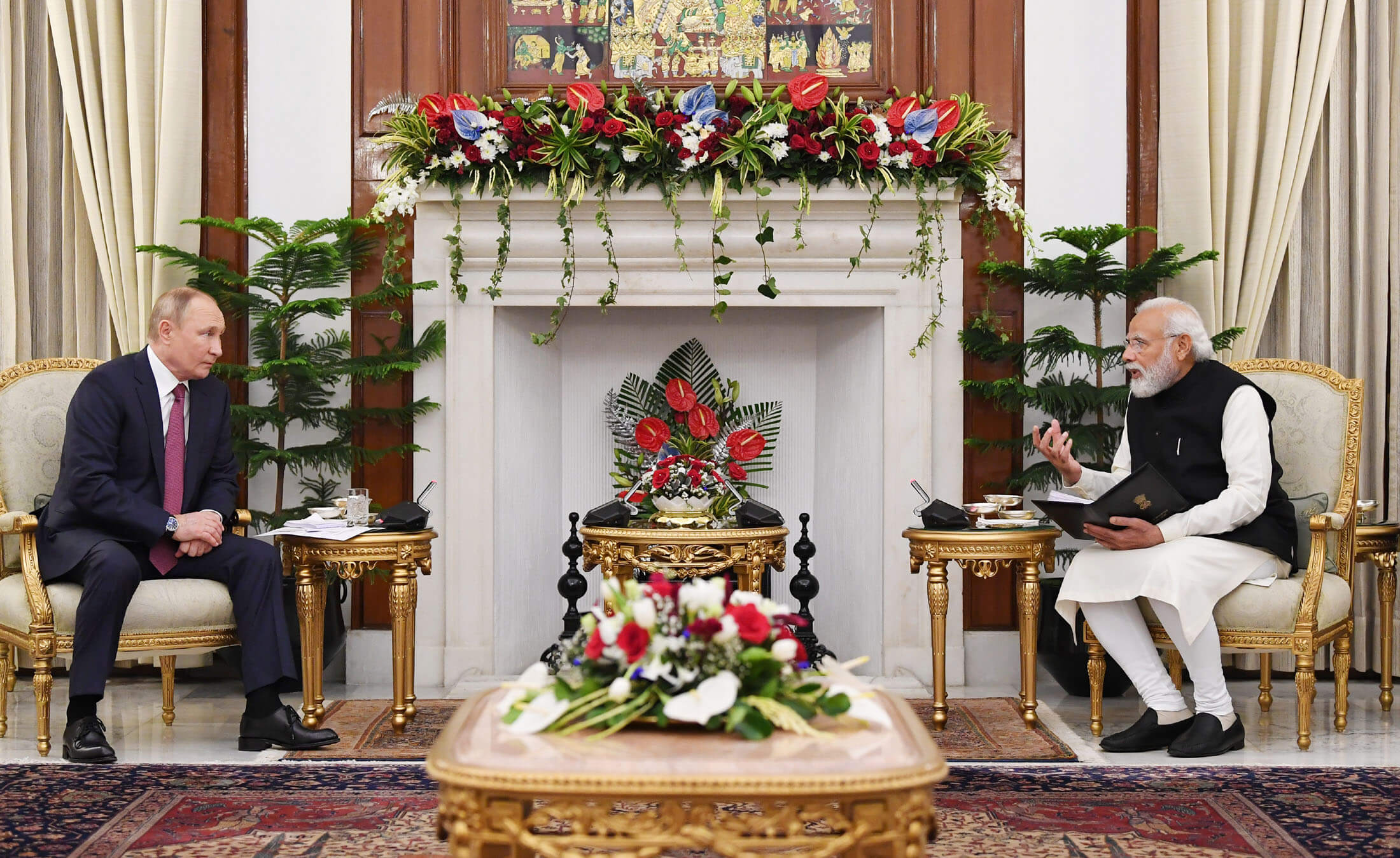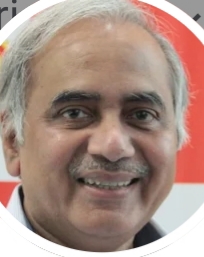
India’s ‘Look Central Asia Policy’

After the high level meeting between Prime Minister Narendra Modi and President Vladimir Putin, the implementation of the agenda is left to the secretarial and deputies level meetings. But considering the importance of the agenda and the age old relationship between the two countries, both leaders decided to follow up on the agenda themselves. The telephonic conversation between the two has taken the relationship to a much greater level. The significance of the telephonic follow up has many other ramifications as well. The impactful follow up call assumes greater importance in the background of a series of events, announcements and geopolitical changes at the regional and global level.
Russia has suggested that a Russia-India-China (RIC) trilateral summit could be held in the near future to work as a coalition against global terror threats. Besides terrorism other issues of common nature could also be discussed. It is reported that the Russian president spoke about his visit to New Delhi and informed Chinese president Xi Jinping of the possibility of such a meeting.
The Russian presidential aide Yury Ushakov spoke about a India-Russia-China trilateral meeting on the lines of the meeting that took place in June 2019 in Osaka on the side lines of the G20 summit. [1] Although it is not clear if the second Russia-India-China (RIC) meeting was discussed in the New Delhi meeting of the two leaders. Besides, there has been no official briefing about the possibility of such a meeting from the Chinese side either. In the absence of a Chinese reaction to such a meeting, the issue remains wrapped in mystery as of now.
But the larger issue is not just the meeting but also the agenda and the outcome of such a meeting. It is obvious that the earlier RIC meeting held in 2019 has produced very little or no results. Even the two high level summit meetings between the highest ranking leaders of India and China has not yielded much results. The India-China standoff continues to remain unresolved despite nearly thirteen rounds of talks and multiple efforts to normalise the situation.
Meanwhile, Moscow could be wanting to broker peace between its two ‘friends’ so that the three countries could pool their strengths to stabilise the region. While the region does need to be stabilised and return to the road to economic recovery, no single country is capable of taking a lead in that direction, much less brokering peace.
So why would Moscow want to take the initiative in organising the RIC meeting and want India and China to be on the same page as far as regional security and stability is concerned? One possibility is to fill the void created by the US exiting Afghanistan. It will not be far from reality to say that America’s Asia policy and especially China policy is far from successful.
What began as America’s engagement with Asia and Indo-Pacific (then Asia Pacific) has taken a confused turn. Asia with close to half of world’s population, a third of global GDP and having some of the best military minds, resources and wealth was no doubt very central to US’s national interests. The Asian Rebalance has reached nowhere after three US presidents. President Obama sought to build a ‘constructive relationship’ with China so that it becomes an increasingly capable and active partner in addressing regional and global challenges. After just less than half a decade China has become a challenge for the US. Again, American policy vis-à-vis Afghanistan termed as ‘global war on terrorism’ turned out to be a fiasco. Less said the better as far as what the US achieved in Kabul.
After almost three decades of disintegration Russia is embarking on the twin policies of befriending China and declaring a global war on terrorism. Russian Deputy Foreign Minister Oleg Syromolotov in a video address at a Beijing symposium on struggle against terrorism is reported to have recalled the Russian action plans to strengthen the counter-terrorism efforts along with its partners within the framework of the UN charter, UN Security Council resolutions, BRICS framework and other international conventions. “Russia is prepared to pool efforts with China and to take real, constructive efforts without politicization to combat global terrorism, including its manifestations in Afghanistan”, the Deputy Foreign Minister Oleg Syromolotov is reported to have told the Chinese leadership.
Unlike the US or India, Russia does not have any serious terror threats inside its territory. Addressing the Security Agency Workers Day president Putin declared that more than 200 terror attacks have been foiled in the last eleven years and more than 32 terror attacks foiled in last eleven months. But he cautioned about that ‘international situation is challenging and the nature and scale of current challenges and risks make higher demands on the work of special services’.
As of now it appears that Russia’s keenness in activating its counter-terrorism mechanism seems to be prompted by its agenda of flexing its military muscles in Kabul and regain the base it lost. In this endeavour Moscow hopes to have India and China as its partners. After the US forces quit Kabul, Afghanistan under the iron grip of the Taliban seems to be emerging as the arena for power posturing and contest between the US and Russia with a new and powerful contestant, China, entering the fray. Afghanistan’s geographic proximity to New Delhi makes the situation scarier.
India’s hopes of emerging as a five trillion economy have been shattered by terrorism, regional instability and the pandemic. In the face of military challenges in the Western and Northern border and the need to ramp up manufacturing to perk up the economy, New Delhi has entered into a series of agreements with Russia to meet the defence and energy requirements. The follow up telephone call is to reinforce the importance and the urgency of the friendship. The hindi-rusi bhai bhai is good for the time being. But is it enough in itself for us to meet the emerging challenges and prospective opportunities?
It is inevitable for India to expand its trade and networking base far and wide to cover the Indo-pacific on the one side and Africa and Central Asia on the other side. Taking a leaf out of China’s strategy book will be useful at this juncture. China’s strategy for increasing its influence in the region and in India’s extended neighbourhood was prompted by the changed geopolitical realities after the disintegration of the former Soviet Union and consequential situation emerging in the region common to both India and China. In order to realize its ambition of emerging as a regional and global power, China embarked on a growth plan that visualized three target areas such as Asia, Africa and Latin America.
China has followed a “three track balance of power strategy” in Asia. One it is attempting to maximize power gap between strong Asian neighbours through focussed military modernization and simultaneously leveraging its economic and political clout. It is using states like Iran, Pakistan, Central Asian Republics and Myanmar as proxies in above balance of power strategy, access to critical oil and gas resources and to Indian Ocean.
Lastly using soft power through multilateral economic and political engagement to enhance its strategic influence in Asia”, a 10 billion dollar loan to ASEAN for development of land and rail communication corridors as also development assistance is a case in point. Thus the central pillar of Beijing’s peripheral policy is “to ensure peaceful and dependable periphery through economic engagement and infrastructural developments.
Incidentally, the foreign ministers of five Central Asian countries Kazakhstan, Kyrgyz Republic, Tajikistan, Turkmenistan and Uzbekistan were in New Delhi to attend the third India-Central Asia Dialogue. All of them met with the Prime Minister who assured them of India’s closest cooperation and support in economic development of “India’s extended neighbourhood”.
India has to act fast and grab this opportunity to build a strong economic partnership with the energy rich Central Asia through rail, road and cyber connectivity. In exchange the ports on India’s Western sea coast can be made available to the land locked Central Asian countries and also Afghanistan, if it returns to democracy and normalcy.
For a robust, viable and seamless connectivity and gas and oil supply pipelines the country of origin and the end user have to have a safe route and terror free atmosphere. If we want the commercial projects not to go the multibillion dollar Turkmenistan-Afghanistan-Pakistan-India (TAPI) way, New Delhi needs a stronger strategy to deal with the impediments. New Delhi should recognise the importance of regaining the areas illegally occupied by Pakistan and illegally ceded to China for a smooth and unrestricted access and connectivity to Afghanistan and Central Asia. The world, and more importantly Russia should be made aware of the changing ground realities and dynamics of regional geopolitics and geo-economics.
****************
References :-
[1] https://tass.com/politics/1375987
Disclaimer
The opinions expressed in this article are the author’s own and do not reflect the views of Chanakya Forum. All information provided in this article including timeliness, completeness, accuracy, suitability or validity of information referenced therein, is the sole responsibility of the author. www.chanakyaforum.com does not assume any responsibility for the same.
Chanakya Forum is now on . Click here to join our channel (@ChanakyaForum) and stay updated with the latest headlines and articles.
Important
We work round the clock to bring you the finest articles and updates from around the world. There is a team that works tirelessly to ensure that you have a seamless reading experience. But all this costs money. Please support us so that we keep doing what we do best. Happy Reading
Support Us





















POST COMMENTS (1)
Mukesh.Naik